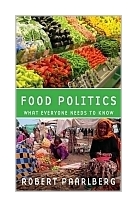|
||
podział tematyczny • wydawnictwa anglojęzyczne podział tematyczny Newsletter: • Zamów informacje o nowościach z wybranego tematu Informacje: • sposoby płatności i dostawy • kontakt • Cookies na stronie • Regulamin zakupów Napisz propresssp@gmail.com |
FOOD POLITICS: WHAT EVERYONE NEEDS TO KNOWPAARLBERG R.wydawnictwo: OXFORD UNIVERSITY , rok wydania 2010, wydanie Icena netto: The politics of food is changing fast. In rich countries, obesity is now a more
serious problem than hunger. Consumers once satisfied with cheap and convenient food now
want food that is also safe, nutritious, fresh, and grown by local farmers using fewer
chemicals. Heavily subsidized and under-regulated commercial farmers are facing stronger
push-back from environmentalists and consumer activists, and food companies are under the
microscope. Meanwhile in developing countries, agricultural success in Asia has spurred
income growth and dietary enrichment, but agricultural failure in Africa has left one
third of all citizens undernourished. The international markets that link these diverse
regions together are subject to sudden disruption, as noted when an unexpected spike in
international food prices in 2008 caused street riots in a dozen or more countries. Robert Paarlberg is the B.F. Johnson Professor of Political Science at Wellesley College and Associate at the Weatherhead Center for International Affairs, Harvard University. A leading authority on food policy, his books include Starved for Science, Policy Reform in American Agriculture, and Fixing Farm Trade. Table of Contents Introduction 240 pages, Paperback Księgarnia nie działa. Nie odpowiadamy na pytania i nie realizujemy zamówien. Do odwolania !. |


